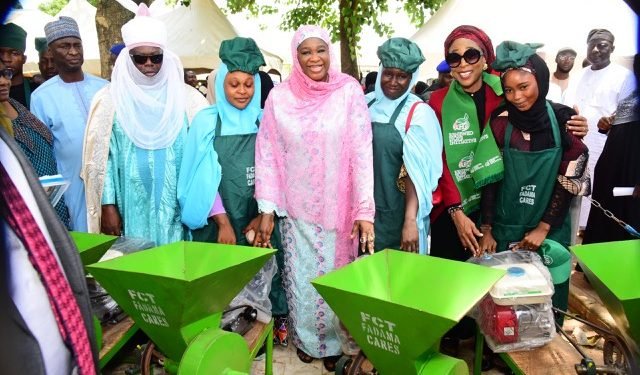Federal Govt Commence Disbusing Grant to Farmers in FCT
In a major step toward strengthening agricultural development in the Federal Capital Territory (FCT), the Federal Government has made substantial progress by providing grants to 9,170 farmers under the Fadama CARES initiative. This achievement marks a significant milestone in the first year of the current administration, reflecting its commitment to improving the agricultural sector. Dr. Mariya Mahmoud, the Minister of State for the FCT, highlighted this during the launch of the fourth batch of grants, which further expanded the program’s reach.
The Fadama CARES initiative, which focuses on bolstering food security and reviving agricultural activities, has already supported 3,150 farmers in its third phase. The fourth batch will now extend assistance to 6,020 more beneficiaries, bringing the total to 9,170 farmers. This represents a 216% increase from the 4,233 farmers previously served in the two years prior to the new administration. Dr. Mahmoud emphasized the significance of this growth, stating, “This substantial increase in beneficiaries not only demonstrates our commitment to improving livelihoods but also reflects a significant achievement for both the state and the nation.”
Beyond financial aid, the program is making strides in infrastructure development by improving water and sanitation facilities across ten wet markets in the FCT’s six area councils. This move is aimed at facilitating smoother food supply chains, particularly in markets, ensuring farmers and consumers benefit from more hygienic conditions.
The Fadama CARES program is particularly focused on supporting women and unemployed youth who are engaged in agriculture, recognizing them as key players in boosting food production and economic stability. Dr. Mahmoud noted that this effort aligns with President Bola Ahmed Tinubu’s “Renewed Hope Agenda,” which places a strong emphasis on food security and poverty reduction. The program, she said, is part of a broader strategy aimed at uplifting the poor and vulnerable while enhancing agricultural productivity.
The government’s approach to youth empowerment is also a highlight of the program. Through collaborations with institutions such as the FCT-Leventis Foundation School of Agriculture, 94 graduates have been provided with starter packs, equipping them with tools to apply their agricultural training in real-world settings. This initiative is designed to empower the next generation of farmers, giving them the support they need to thrive in the industry.
Providing further details on the disbursements, Lawan Kolo Geidam, the Mandate Secretary for Agriculture and Rural Development, explained that 82 farmers’ community associations across the FCT’s six area councils are also beneficiaries of the fourth batch. Over the past year, significant agricultural inputs have been distributed to support farmers. These include 12,436 bags of NPK fertilizer, 6,218 bags of urea, 18,654 liters of agrochemicals, and 43,526 kg of assorted seeds. Additionally, farmers have received 55,400 day-old chicks, 7,756 bags of poultry feed, 81,800 catfish juveniles, and 2,045 bags of fish feed to enhance poultry and fish farming.
Under the program’s Disbursement Linked Indicator (DLI) 2.3, more farming resources have been provided, including 3,690 goats, 3,212 sets of farm equipment like sprayers and water pumps, 1,006 grinding machines, and 22 multi-purpose threshers with a capacity of 2MT/hour. Furthermore, water and sanitation facilities have been installed in key markets across the FCT to boost hygienic conditions and support local food trading.
As the event concluded, farmers were handed essential farming items such as fertilizers, seeds, agrochemicals, sprayers, and personal protective equipment. These resources, provided under the Fadama CARES initiative, will help farmers enhance their agricultural practices, strengthen their productivity, and ultimately boost the local economy.
This comprehensive approach demonstrates the government’s commitment to transforming the agricultural sector in the FCT, improving food security, and empowering vulnerable populations through targeted support and infrastructure development.





















